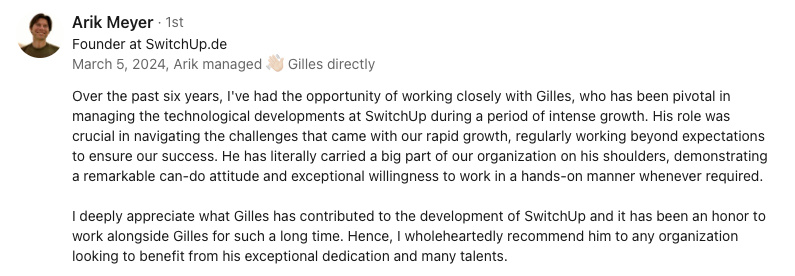Abstract:
The article emphasizes the importance of integrating a privacy-centric culture within startups, transforming privacy from a regulatory burden into a strategic asset. It highlights that privacy should be a core organizational value, guiding business decisions and fostering trust with customers and stakeholders. This proactive approach aligns with legal standards, enhances brand reputation, and provides a competitive edge by appealing to privacy-conscious consumers. Leadership commitment is crucial, setting an example and embedding privacy into strategic objectives. Continuous education, transparent communication, and cross-functional collaboration are vital for maintaining a strong privacy culture. The article provides real-world examples, such as ProtonMail and Tresorit, which demonstrate the long-term benefits of prioritizing privacy, including enhanced trust, market differentiation, and scalability. By making privacy a fundamental part of their mission, startups can ensure regulatory alignment while fostering growth and innovation.
Navigating the startup world isn't easy, especially with privacy concerns in every decision. Many entrepreneurs find it challenging to make privacy a core part of their business rather than just another requirement. This article shows how focusing on privacy can change a startup, turning it from a regulatory headache into a strategic advantage. By making privacy part of everyday operations, startups not only protect data but also build strong customer trust. This approach aligns with legal needs and encourages growth and innovation. Additionally, startups often face the challenge of limited resources and the need to balance data utility with privacy obligations, making it crucial to integrate privacy effectively.
Defining privacy culture
In startups, privacy culture is a proactive approach deeply tied to the company's values and actions. It's not just about checking off regulatory boxes; it's about making privacy a core organizational value. This ensures privacy guides business decisions and interactions. A solid privacy culture protects data and builds trust with customers and stakeholders, enhancing the startup's reputation and reliability.
Understanding privacy culture
To create a strong privacy culture, startups must integrate privacy into daily operations, not treat it as an outside obligation. Privacy should be part of the startup's mission and practices. Unlike compliance-focused methods that aim to meet external standards, a privacy-centric culture is built into the startup's identity. This change in approach can elevate decision-making processes and build a foundation of trust and growth.
The strategic edge of privacy culture
Embracing a privacy-centric culture offers many strategic benefits. For startups, where customer relationships and trust are crucial, consistently integrating privacy can lead to sustainable growth and stability. A privacy-focused approach not only aligns with legal standards but also boosts brand reputation and customer loyalty. This proactive mindset connects with consumers who value their privacy, giving startups a competitive market edge. Leadership is key in guiding the organization toward these long-term benefits.
Implementing a privacy culture
Leadership commitment: the keystone
Leadership commitment is crucial for embedding privacy into a startup's culture. When leaders prioritize privacy as a key value, it sets a strong example for the organization. This commitment isn't just about appointing a Data Protection Officer or ensuring compliance; it's about actively supporting privacy initiatives across all levels. Reflecting on my own experience in leadership, I've seen firsthand how demonstrating a commitment to privacy through actions and decisions creates an environment where privacy becomes everyone's responsibility.
Continuous education: keeping privacy top of mind
Continuous training and education are essential for building a privacy-aware workforce. These programs go beyond basic compliance, focusing on comprehensive awareness of privacy issues and best practices. Regular workshops and training sessions help ensure everyone understands their role in protecting data, making privacy a priority that resonates with the whole company.
Transparent communication: building trust and accountability
Transparent communication is vital in maintaining a strong privacy culture. By openly discussing data privacy policies and practices, startups can build trust with employees and customers. This transparency encourages accountability at all levels, ensuring everyone understands their role in upholding privacy.
Leadership's role in fostering privacy
Strategic leadership ensures alignment
Leadership plays a crucial role in fostering a privacy-centric culture within startups. Strategic leadership involves embedding privacy into the company's strategic objectives and decision-making processes. Leaders align privacy values with the startup's mission and vision by setting clear, privacy-focused goals. This ensures that every business decision reflects a commitment to protecting user data.
Setting the tone from the top
Leaders can practically demonstrate their commitment to privacy by setting a visible and unwavering standard across the organization. This commitment resonates throughout the startup, inspiring employees to prioritize privacy in their daily roles. By regularly communicating the importance of privacy and making it a topic of discussion in strategic meetings, leaders can effectively set this tone.
Demonstrating commitment through action
Leaders must take tangible actions to show their commitment to privacy. This might include developing comprehensive privacy policies and investing in privacy-enhancing technologies and training programs. Real-life examples illustrate how leaders can prioritize privacy through policy development and robust security measures.
Empowering teams to prioritize privacy
Knowledge and tools for empowerment
Empowering employees involves giving them the knowledge and tools needed to prioritize privacy. Empowered employees are the frontline defenders of a privacy culture. Regular privacy training, access to resources, and clear communication are key strategies to help employees feel confident in safeguarding data. Overcoming challenges, such as proving technical and business viability, often involves equipping teams with the right tools and fostering an environment where privacy is integral to success.
Cross-functional collaboration for innovation
Cross-functional collaboration enhances privacy integration. When diverse teams like IT, legal, and marketing work together, they can develop innovative privacy solutions. Startups that foster such collaboration not only improve their privacy measures but also enhance overall business efficiency.
Continuous education to keep pace
Continuous education is essential to adapt to ever-evolving privacy challenges. Effective training programs keep teams informed about the latest developments in privacy regulations and threats. By maintaining ongoing dialogue about privacy, startups ensure their teams remain agile and ready to tackle new challenges.
Creating effective privacy training programs
- Designing effective training programs: Developing a robust privacy training program for non-technical staff requires thoughtful consideration of content and delivery methods. Training programs should engage employees through practical and relatable examples, interactive learning, ongoing updates, and tailored content.
- Leveraging established frameworks and resources: Utilizing established training frameworks is crucial for comprehensive privacy education. Resources such as the NIST Privacy Framework provide structured learning paths that address diverse privacy topics, ensuring that educational content remains comprehensive and adaptable.
- The importance of ongoing education: Continuous education is key to staying ahead of evolving privacy regulations and challenges. Regularly updating privacy training ensures employees remain knowledgeable about the latest developments in data protection.
Engaging non-technical employees
Interactive learning with scenario-based training
Engaging non-technical employees in privacy training can be achieved through interactive and scenario-based learning. Real-life situations and interactive elements make the training more engaging and memorable.
Integrating privacy awareness into daily activities
Integrating privacy practices into everyday work activities reinforces training and fosters a culture of awareness. Simple measures like privacy checklists, regular updates, and privacy champions ensure privacy remains top-of-mind.
Using real-world examples and case studies
Using real-world examples and case studies to illustrate privacy principles enhances understanding and retention. These stories show the tangible benefits of robust privacy practices, making privacy training more effective.
Fostering cross-departmental collaboration for privacy innovation
Building collaborative privacy solutions
Successful collaborations within startups show how diverse teams can create innovative privacy solutions. By involving different departments, a startup can harness a variety of perspectives, leading to more creative and comprehensive privacy strategies.
Examples of successful collaboration
Startups like Duo Security and OneTrust demonstrate how cross-functional collaboration can lead to successful privacy solutions that stand out in the marketplace, offering benefits like increased customer trust and accelerated growth.
Encouraging open communication
Fostering open communication between technical and non-technical teams helps bridge gaps and align privacy goals. Regular inter-departmental meetings and clear channels for feedback promote a sense of community and transparency.
Integrating privacy across business functions
Embedding privacy into core processes
Embedding privacy into business functions like product development, marketing, and customer service is key for a startup's privacy strategy. By integrating privacy considerations into these processes, startups can ensure data protection is a fundamental aspect of their operations.
Real-world integration success stories
Startups like Tresorit and ProtonMail show how privacy can be seamlessly integrated across business functions. Their focus on encryption ensures privacy at every level, resulting in increased user trust and market positioning.
The role of privacy champions
Privacy champions in each department play a vital role in promoting and sustaining privacy initiatives. They advocate for privacy by engaging their teams and ensuring privacy is part of every discussion and decision.
Real-world examples of privacy-centric startups
ProtonMail: prioritizing user privacy
ProtonMail is a leader in encrypted email services, employing end-to-end encryption and a strict no-logging policy. This commitment to privacy has earned ProtonMail high levels of trust from its user base, aligning with GDPR standards and enhancing its reputation globally. Additionally, their approach serves as a model for startups aiming to integrate privacy effectively from the ground up.
Tresorit: secure cloud storage
Tresorit offers secure cloud storage solutions with zero-knowledge encryption. Its proactive alignment with GDPR requirements and dedication to rigorous data protection practices have resulted in significant user growth and a strong market presence. Tresorit's success story highlights the importance of embedding privacy into core business functions to achieve market differentiation.
Long-term benefits of embracing a privacy-centric culture
Building a strong privacy culture offers enduring advantages, from enhanced brand reputation to supporting growth and scalability. By embedding privacy into their core values, startups not only ensure regulatory alignment but also create an environment conducive to consumer trust and market differentiation.
Enhancing brand reputation and trust
Startups with a privacy-centric culture enjoy increased consumer trust and loyalty. A commitment to data protection strengthens brand reputation, securing a competitive market advantage.
Supporting startup growth and scalability
A privacy-first philosophy supports growth by mitigating risks and enhancing resilience. Real-world examples like ProtonMail and Tresorit show how startups can expand operations and enter new markets effectively by prioritizing privacy.
You might be interested by these articles:
- Data Mesh: Shaping the Future of Data Management
- Privacy-Preserving Analytics Solutions
- Safeguarding Data in the Digital Age





